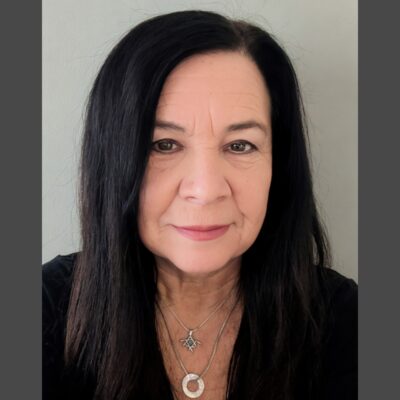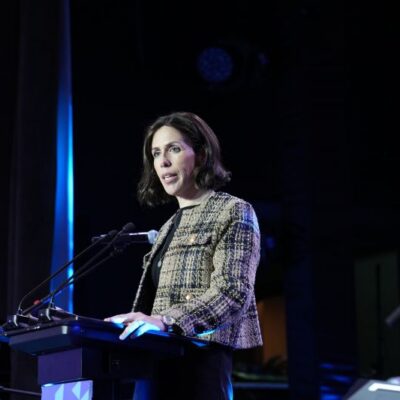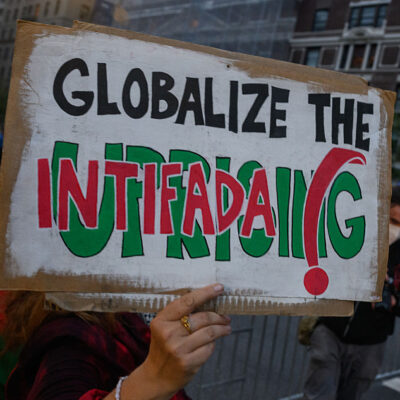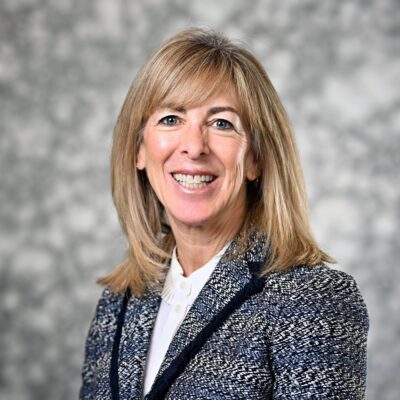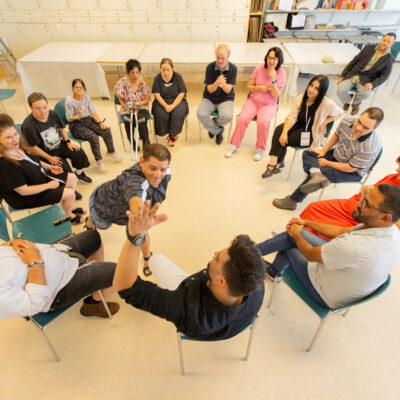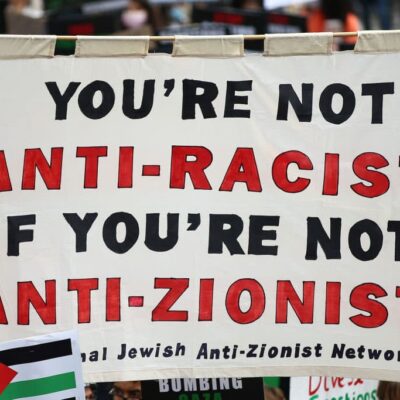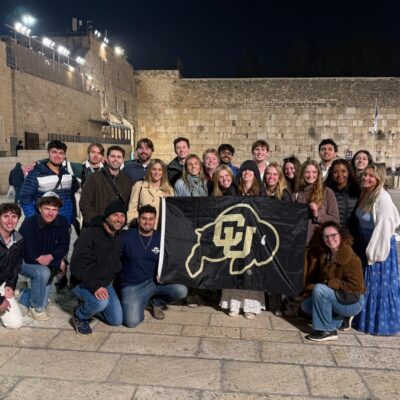The games begin
JCC Maccabi Games kick off in Haifa; Israeli president hopes participants will ‘build bridges’
Over 1,000 teen athletes taking part in the sporting events over the next week, followed by a 12-day educational tour of Israel

Courtesy/JCC Association
Ukrainian athletes enter the auditorium for the opening of the JCC Maccabi Games in Haifa on July 9, 2023.
HAIFA, Israel – The JCC Maccabi Games kicked off on Sunday night in Israel’s northern port city of Haifa with over 1,000 teenage athletes in attendance and with appearances by Israel’s president, NBA star Deni Avdija and the Shalva band.
The games, an annual event, are being held in Israel this year for the first time since 2011. This is part of a plan to do so every four years, the games’ lead organizer, Samantha Cohen, told eJewishPhilanthropy ahead of the launch.
More than 700 North American teenagers – aged 14 to 17 – came to Israel for the games, joined by dozens of teens from Eastern Europe and Morocco, where they met some 300 Israeli participants, the largest number of Israeli athletes to take part in the JCC Maccabi Games ever, organizers said.
“The JCC Maccabi Games are certainly about healthy competition and exciting tournaments, but also about much more than that,” said Israeli President Isaac Herzog in a recorded statement. “They are about you: the young generation of Jewish leaders from North America, Europe and Israel, countries of the Abraham Accords and across the globe.”
Herzog added: “I’m so certain that on the field, on the court, and in the ring, and as you are touring our beautiful country Israel, you will build the bridges of understanding, love and affection with your fellow Jewish people.”
The three-week trip to Israel, which costs approximately $10,000, was heavily subsidized by JCC Association fundraising and by vouchers from RootOne, which is funded by The Marcus Foundation.
Speaking on the sidelines of a VIP event ahead of the launch, Simon Amiel, the executive director of RootOne, told eJP that he was “really excited” about the partnership with the JCC Maccabi Games, seeing it as an opportunity to engage with a group of Jewish teens who are otherwise not significantly involved in Jewish communal life.
Amiel said the organization planned to remain in contact with and track the participants of the games to see how their involvement in the event affected their engagement with the Jewish community going forward. He said that information would also be shared with Hillel International, Chabad and other Jewish organizations.
Amiel shared a story, which was also told by Cohen onstage at the VIP event, about the Philadelphia boy’s soccer team: The team had one Orthodox player on it, who assumed that he would have to go to Friday night services alone. But the rest of his teammates, whom he’d barely met before the games, decided that they should stick together as a team and went with him to synagogue – some for the first time. Amiel said this demonstrated how an event like the JCC Maccabi Games can bring participants closer to Judaism and Jewish communal life. “Not that we’re trying to make people more religious,” he quickly added.
The first nine days of the trip will focus on the games, along with some additional programming, followed by a 12-day tour of Israel.
In her onstage speech at the VIP event, which was attended by donors, organizers and representatives of partner organizations, Cohen described the significance of the JCC Maccabi Games in personal terms, discussing her own participation in the event years prior as a teenage tennis player on the British team.
Cohen recalled standing in Madison Square Garden in Manhattan, along with thousands of other Jewish teens from around the world, singing “Hatikva.” She said that two-week experience helped form her understanding of Jewish peoplehood, which continues to guide her work today as vice president for program and talent at JCC Association of North America and head of JCC Maccabi.
“When I got on that plane [to New York], I got on as a British tennis player. And two weeks later, I flew home as a proud Jewish athlete,” Cohen said, drawing applause from the crowd.
The launch event highlighted the participation of 10 teenagers representing Ukraine, five of them who now live abroad and five of whom still live in Ukraine “where they are in danger every single day,” the announcer, U.S.-born Israeli singer Michael Harpaz, said.
The Ukrainian delegation earned a standing ovation as it made its way into the auditorium where the launch was held. Attendees also waved Ukrainian flags, which had been provided by the organizers, as the team members made their way to their seats.
The games officially kicked off with the lighting of a ceremonial torch by Avdija, who plays for the NBA’s Washington Wizards.
Asked to say something before lighting the torch, Avdija opted for a classic and laconic: “Let the games begin!”

 Add EJP on Google
Add EJP on Google
